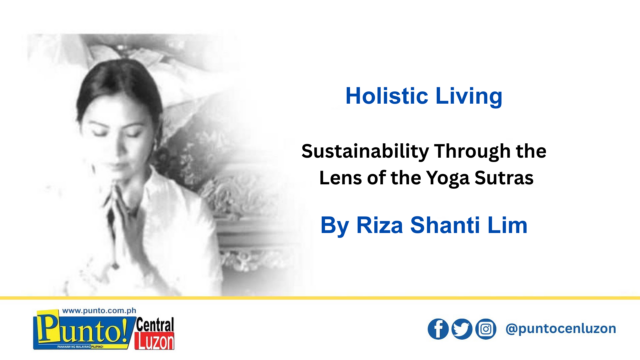As the climate crisis intensifies and ecological balance teeters – global conversations around sustainability have never been more urgent. But while modern science offers essential tools and data, ancient spiritual traditions like yoga, provide timeless wisdom that can inspire more holistic and heartfelt action. In particular, the Yoga Sutras of Patanjali, known as the 8 Limbs or Principles of Yoga – a foundational text of classical yoga philosophy, holding profound insights into how we can live more harmoniously with ourselves, each other, our environment, and the Earth.
At its core, yoga means union. The understanding that everything in nature is deeply connected and mutually dependent. The insight that every form of life is woven into a single, unified existence.
This philosophy naturally extends to how we treat the planet. The Yoga Sutras outline ethical principles known as the Yamas and Niyamas, which serve as a moral compass for personal and collective well-being. These can also be interpreted through the lens of environmental responsibility.
Ahimsa (Non-violence): More than just avoiding physical harm, ahimsa invites us to practice compassion in every choice we make – including how we consume. Opting for plant-based diets, reducing plastic use, and supporting ethical businesses are all modern expressions of ahimsa that help minimize harm to the Earth and its beings.
Aparigraha (Non-possessiveness): In a world driven by overconsumption, aparigraha reminds us to take only what we need. This principle encourages mindful living, minimalism, and a reduced ecological footprint—key tenets of sustainability.
Santosha (Contentment): The practice of santosha asks us to find satisfaction in simplicity. In terms of environmental impact, this can translate to a less materialistic lifestyle, curbing the endless pursuit of more, and appreciating what already exists.
Tapas (Discipline): Sustainable living often requires effort and discipline – habits like conserving energy, recycling diligently, or advocating for policy change. Tapas fuels the inner fire needed to commit to these actions, even when they are inconvenient.
Svadhyaya (Self-study): Reflection leads to awareness. By examining our habits, we can identify areas where we unintentionally contribute to environmental degradation, and gradually realign our behavior.
In many ways, the Yoga Sutras guide us toward sustainability not as an obligation, but as a natural extension of a conscious, connected life. When we slow down, cultivate awareness, and recognize the sacredness of all life, we begin to live in ways that support – not exploit our planet.
The journey to sustainability is not just about technological innovation or policy reform, but also about a shift in consciousness. Ancient yogic wisdom, far from being outdated, offers a timeless foundation for this shift. By embodying the teachings of the Sutras, we not only nourish our inner world – we help sustain the Earth itself.
Now more than ever, each of us has a role to play in sustaining the health of our planet. The Sutras remind us that real change must begin within – with awareness, compassion, and intentional positive lifestyle. Whether you are a lifelong yogi or simply someone who cares about the Earth, let these timeless principles inspire your choices. Embrace simplicity, practice kindness., and take only what you need. Every small, conscious act creates a ripple. Together, we can shape a future rooted in balance, respect, and renewal – for ourselves and for generations to come.
Namaste.
Riza Shanti Lim





